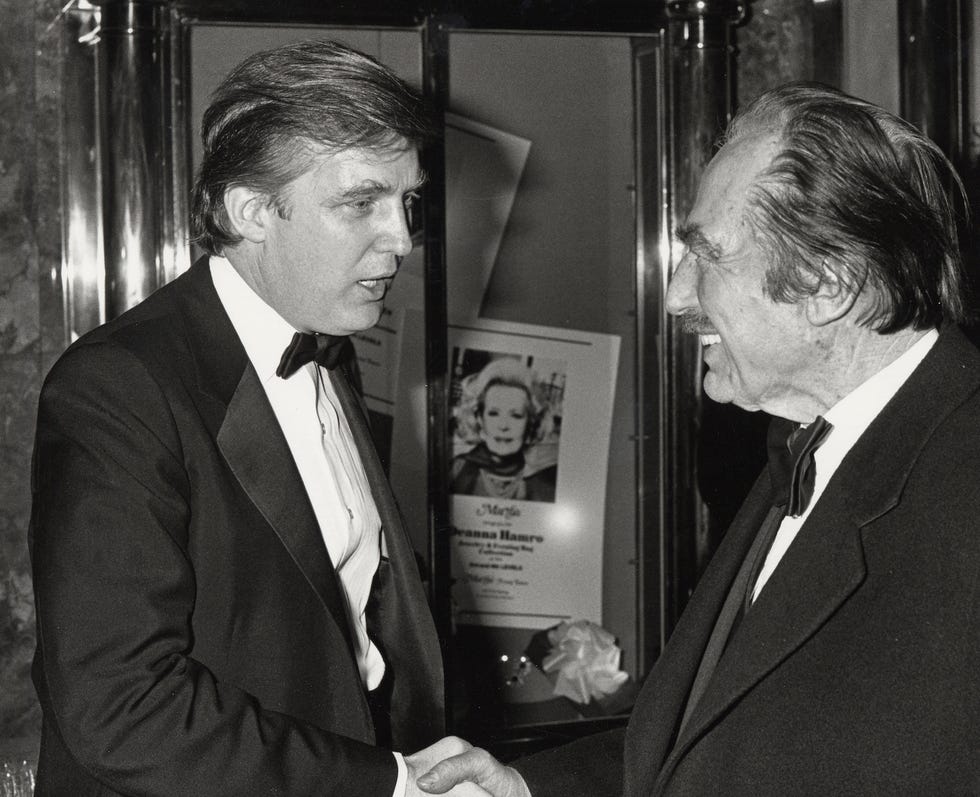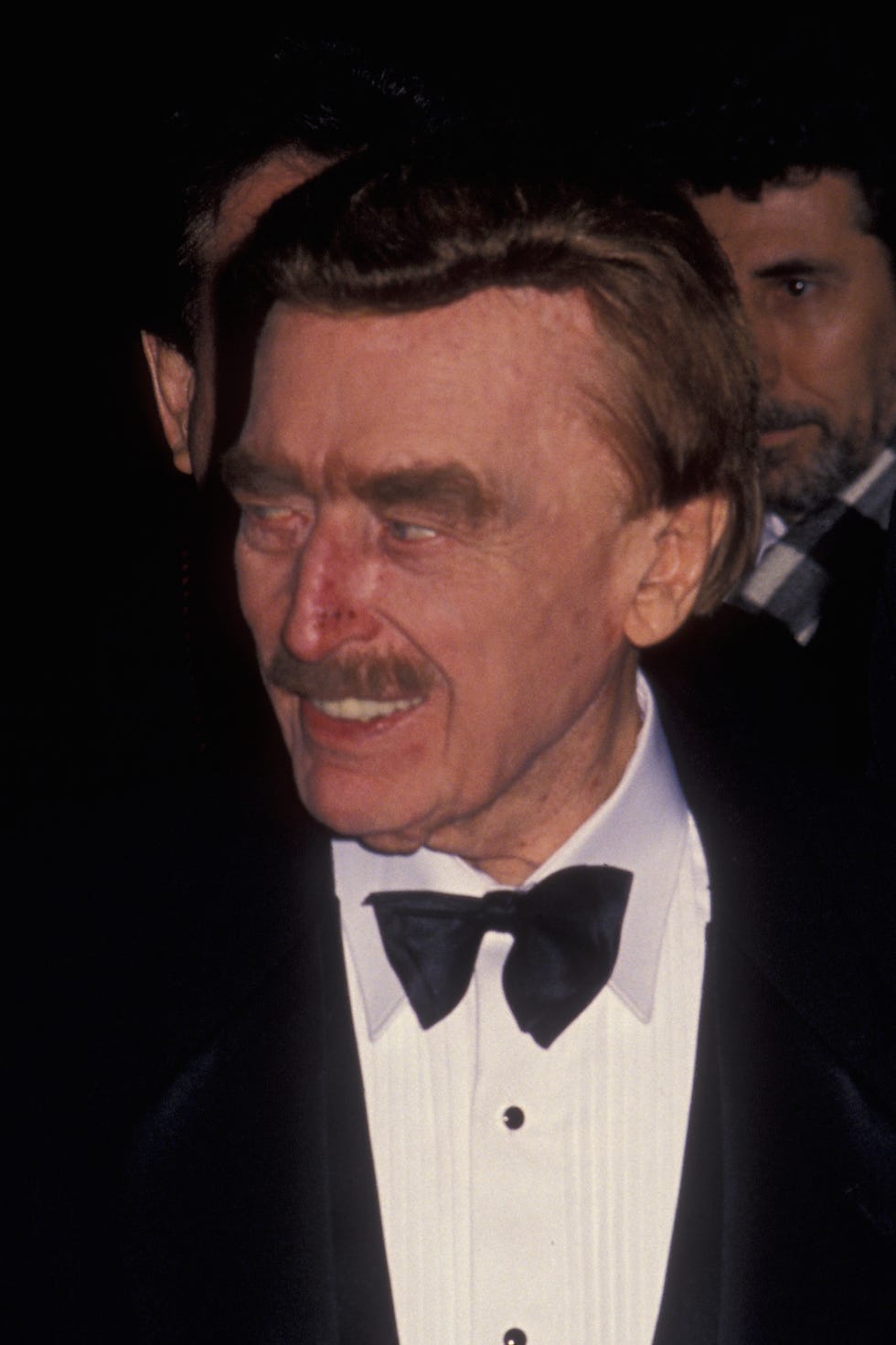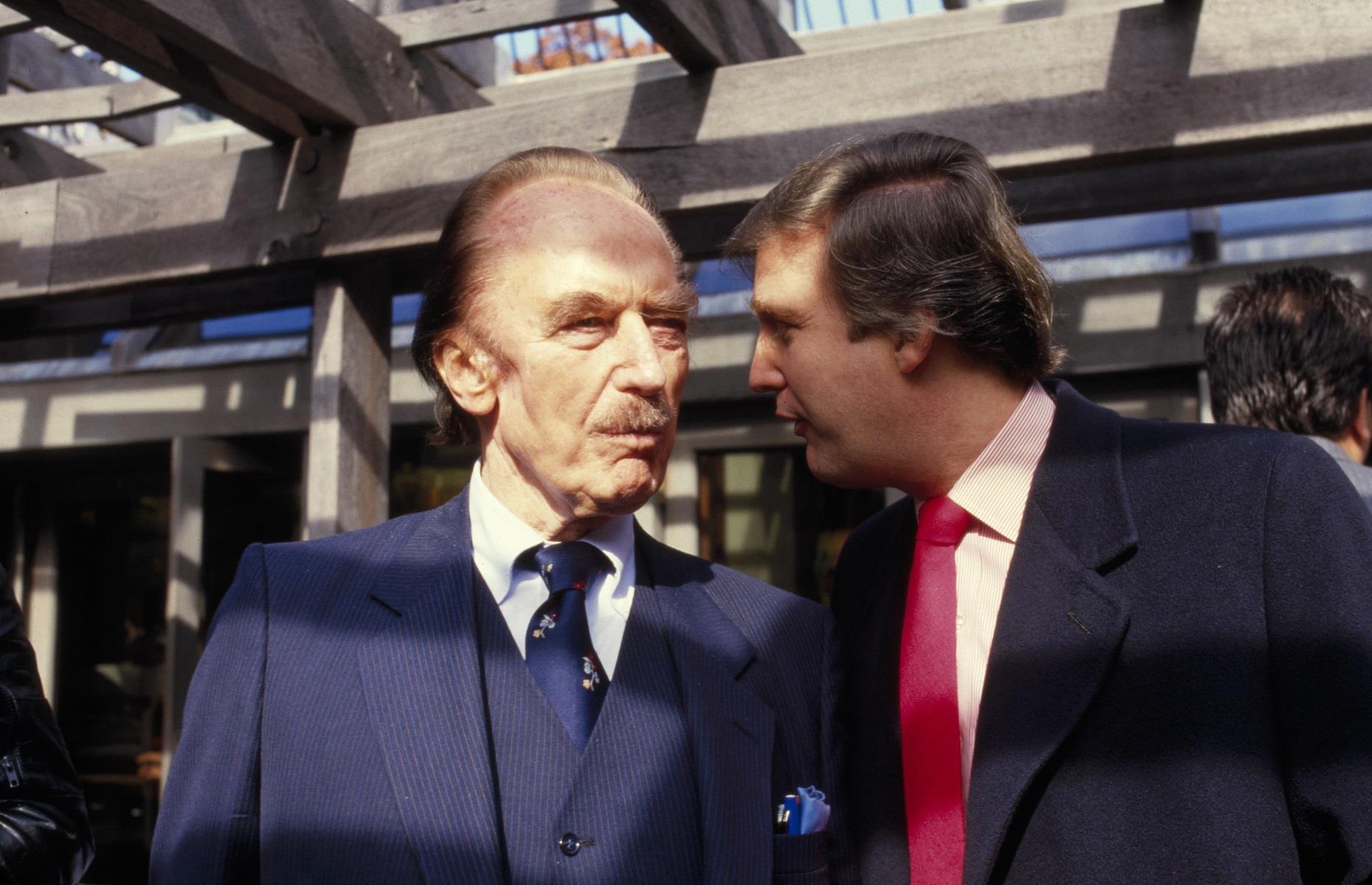Donald Trump Father: Uncovering Fred Trump's Enduring Legacy In Real Estate
When we consider the paths that shape prominent figures, looking into their family origins often provides deep insights. The story of donald trump father, Fred Trump, is one that offers a compelling look at the foundations of a significant family fortune and a lasting presence in New York City's real estate world. Understanding his life helps us grasp the forces that shaped a future president. It is that, a story of ambition, building, and influence, which truly captures attention.
Much like how a wall-hung vanity unit provides a clear, organized space for a bathroom, or how a dependable heat pump offers consistent comfort in a home, Fred Trump built structures and systems that provided foundational support. His approach to business, in a way, created a framework for future generations. We can see, too, how his methods and experiences, almost, laid the groundwork for many things that followed.
This article will explore the life and impact of Fred Trump, the man who was the donald trump father. We will look at his beginnings, the growth of his real estate endeavors, and the profound influence he had on his son, Donald. So, let us consider the details of a life that left a significant mark on the city and a family.
Table of Contents
- Fred Trump: A Life in Overview
- Personal Details and Biography
- The Father-Son Connection
- Fred Trump's Legacy
- Common Questions About Fred Trump
Fred Trump: A Life in Overview
Fred Trump, the donald trump father, began his journey in Queens, New York, in the early 20th century. Born Frederick Christ Trump in 1905, his early years were marked by a drive to build and create. His family had roots in Germany, and he grew up in a household that valued hard work and self-reliance. He was, in a way, a person who learned early on how to make things happen for himself.
Early Days and Beginnings
Fred Trump's start in real estate came at a rather young age. He began building homes shortly after finishing high school. His initial projects were single-family houses, constructed in the outer boroughs of New York City. He showed a knack for identifying areas with growth potential, which, you know, is a key skill in that field. These early efforts laid the groundwork for what would become a much larger enterprise.
He started his business, Elizabeth Trump & Son, with his mother, Elizabeth. This partnership allowed him to access initial capital and begin his work. The company focused on building housing for the middle class, a segment of the market that was growing rapidly in the post-World War I era. So, he really saw an opportunity there, and he took it.
His approach involved acquiring plots of land, often in Queens and Brooklyn, and then building multiple homes at once. This method allowed for efficiencies in construction and cost savings. He learned, apparently, how to streamline the building process, which gave him an advantage over smaller builders. These early developments were often modest but well-built homes.
Building an Empire
As the decades went on, Fred Trump's building activities expanded significantly. During the Great Depression, he continued to build, focusing on smaller, affordable homes and even supermarkets. He had a keen sense for where the market was headed, and how to adapt, which, you know, is a sign of a truly effective business person.
After World War II, his business really took off. The demand for housing for returning veterans and their families was enormous. Fred Trump received government loans to build large housing complexes, particularly in Brooklyn and Queens. These projects included thousands of units, often in large, brick apartment buildings. He built places like Shore Haven and Beach Haven, which provided homes for many New Yorkers. He was, in a way, helping to house a generation, which is a big deal.
His developments were known for their functional design and relatively quick construction. He focused on volume and efficiency, aiming to provide housing that was accessible to a wide range of people. This strategy allowed him to accumulate substantial wealth and establish himself as a major player in the New York real estate scene. He was, basically, a master of getting things done on a grand scale.
Business Practices and Public Scrutiny
Fred Trump's business career was not without its challenges and public examination. He faced accusations of racial discrimination in his housing developments during the 1960s and 1970s. The Justice Department filed a civil rights lawsuit against him and his company in 1973, alleging that they refused to rent to Black tenants. This was, you know, a very serious charge.
The company denied the allegations, but the lawsuit brought considerable attention to their rental practices. The case was eventually settled, with the Trumps agreeing to take steps to prevent future discrimination. This period showed a side of the business that was, apparently, less about building homes and more about legal battles. It highlights how even a very successful business can face public challenges.
He also faced scrutiny over the use of government funds for his projects. Some critics questioned the profits he made from federal loan programs designed to encourage housing construction. Despite these issues, he continued to operate his business, maintaining a strong presence in the New York real estate market for decades. He was, in a way, a person who kept going no matter what came his way.
Personal Details and Biography
Here is a quick look at some key facts about Fred Trump, the donald trump father:
| Full Name | Frederick Christ Trump |
| Born | October 11, 1905 |
| Birthplace | The Bronx, New York, USA |
| Died | June 25, 1999 (age 93) |
| Spouse | Mary Anne MacLeod Trump |
| Children | Maryanne Trump Barry, Fred Trump Jr., Elizabeth Trump Grau, Donald Trump, Robert Trump |
| Occupation | Real Estate Developer |
| Known For | Building thousands of middle-income homes and apartments in New York City's outer boroughs; founding the Trump Organization's real estate empire. |
The Father-Son Connection
The relationship between Fred Trump and his son, Donald, is a topic of much discussion. Fred was, in a way, a very hands-on father when it came to business education. He instilled in Donald a deep understanding of real estate, the art of the deal, and the importance of public recognition. This connection was, apparently, a formative one for Donald.
Mentorship and Influence
From a young age, Donald Trump spent time observing his father's business activities. He accompanied Fred to construction sites and learned about the practical aspects of building and managing properties. Fred taught him about negotiating, about the value of land, and about how to deal with contractors and tenants. This was, you know, a very practical education.
Fred Trump was known for his demanding nature and his focus on results. He expected his children to work hard and to understand the family business. Donald, in particular, seemed to absorb these lessons. The influence of Fred's business style, his directness, and his ambition can be seen throughout Donald's career. It's almost as if the lessons were deeply ingrained.
The financial backing Fred provided was also a significant factor in Donald's early ventures. While Donald later sought to establish his own identity in Manhattan, away from his father's outer-borough focus, the initial capital and business acumen came directly from Fred. This foundational support, much like the concealed plumbing pipes a wall-hung vanity unit hides, was essential, even if not always seen. So, there was a lot of hidden support there, actually.
Passing the Baton
As Fred Trump aged, he gradually transferred control of his real estate empire to his children, particularly Donald. This transition was a pivotal moment for the Trump Organization. Donald took the family business beyond its traditional focus on middle-income housing in the boroughs and moved it into high-profile Manhattan developments. He sought to build luxury properties and casinos, a different kind of project. This shift was, in a way, a departure from the family's established methods.
Fred Trump lived to see his son become a prominent figure in New York's business world. He reportedly remained a source of advice and support, even as Donald pursued projects that were grander and more public than his own. The passing of the business was not just a transfer of assets; it was a continuation of a legacy, albeit with a new vision. It was, apparently, a very significant moment for the family's future direction.
The story of the Trump family's business growth is, in some respects, a story of two generations building upon each other's efforts. Fred built the foundation, and Donald expanded upon it in a different way. This kind of progression, you know, is a common theme in family businesses that achieve great success. It shows how a family's work can evolve over time.
Fred Trump's Legacy
The legacy of Fred Trump is complex and multifaceted. He was a builder who provided housing for thousands of families in New York City. His projects shaped the physical landscape of Brooklyn and Queens, creating communities and neighborhoods. His influence, in a way, goes beyond just the buildings he constructed; it touches on the social fabric of those areas. He really left his mark on the city.
Shaping the Landscape
Fred Trump's housing developments were often large-scale, offering a consistent style and a certain kind of living. They provided affordable options for many people seeking homes after the war. These buildings still stand today, serving as a reminder of his prolific career. They are, basically, a tangible part of New York's history. Like the durable Heil rear load garbage trucks that serve cities and towns, his buildings have endured over time, providing essential services.
His business model, which focused on efficiency and volume, allowed him to build quickly and at a lower cost. This approach made homeownership or affordable rentals possible for many. He was, in a way, a pioneer in mass housing construction. His methods, apparently, influenced how large-scale residential projects were approached in the mid-20th century. He changed how many people lived.
The scale of his operations was quite remarkable for his time. He was not building just a few homes; he was creating entire communities. This vision for large-scale development, you know, set him apart from many other builders. It shows a truly ambitious spirit and a willingness to take on big projects. So, he really thought big.
Enduring Impact
Beyond the physical structures, Fred Trump's most significant impact might be seen in the business principles he passed down. His emphasis on aggressive negotiation, self-promotion, and a relentless pursuit of opportunity became hallmarks of the Trump business style. These lessons, in a way, transcended the real estate business itself. They were about how to operate in the world of commerce.
His legacy also includes the wealth he accumulated, which provided the financial bedrock for his family's subsequent ventures. This wealth allowed Donald Trump to pursue even larger, more visible projects and eventually enter politics. The foundation laid by Fred was, apparently, crucial for these later endeavors. It's almost like a financial springboard.
As of late 2023 and early 2024, discussions about family legacies and their influence continue to be a topic of public interest, making the story of Fred Trump particularly relevant. People often look to the past to understand the present, and his life offers many points of consideration. He remains a figure whose influence, you know, continues to be felt in various ways.
Common Questions About Fred Trump
Many people have questions about Fred Trump and his life. Here are some common inquiries, addressing what people often want to know about the donald trump father.
Who was Fred Trump?
Fred Trump was a prominent American real estate developer, born in 1905, who built thousands of homes and apartment buildings in the New York City boroughs of Queens and Brooklyn. He founded the Trump Organization and was the father of Donald Trump. He was, basically, a very successful builder who focused on middle-income housing. He made a name for himself in the housing market.
What kind of business did Fred Trump run?
Fred Trump primarily ran a residential real estate development business. His company, Elizabeth Trump & Son, later known as the Trump Organization, specialized in building and managing large-scale apartment complexes and single-family homes. He often used government loans to finance these projects, providing housing for the post-World War II boom. He was, in a way, a master of building many homes quickly and efficiently. His business was about providing places for people to live.
How much money did Fred Trump leave Donald?
Fred Trump's estate was estimated to be worth between $250 million and $300 million at the time of his death in 1999. Donald Trump and his siblings inherited a significant portion of this wealth, along with control of the family's extensive real estate holdings. While the exact amount Donald received directly is complex due to various transfers over time, it was, apparently, a substantial sum that helped fund his own ventures. It was, you know, a very large inheritance.
Conclusion
The story of Fred Trump, the donald trump father, is a compelling narrative of ambition, growth, and lasting impact. From his early days building modest homes to his creation of large housing complexes, he shaped parts of New York City and laid the financial groundwork for his family. His influence on Donald Trump, both in business acumen and personal drive, is, apparently, undeniable.
Understanding Fred Trump's life provides a crucial perspective on the origins of the Trump family's prominence and the forces that molded a future president. His legacy, like the durable and innovative products described in 'My text'—whether it's the efficient design of a wall-mounted vanity or the lasting quality of Heil refuse collection vehicles—speaks to a dedication to building things that endure. So, his work truly had a lasting quality.
We invite you to consider the many ways family histories and personal foundations shape the paths of individuals. Reflect on how early experiences and parental guidance can, in a way, set the stage for future accomplishments and challenges. What aspects of Fred Trump's life do you find most interesting? We would love for you to share your thoughts and explore more about significant figures and their backgrounds on our site.

Fred Trump: 16 Things You Didn't Know About Donald Trump's Father

Fred Trump: 16 Things You Didn't Know About Donald Trump's Father

The story of Fred Trump: how Donald Trump's father made his millions